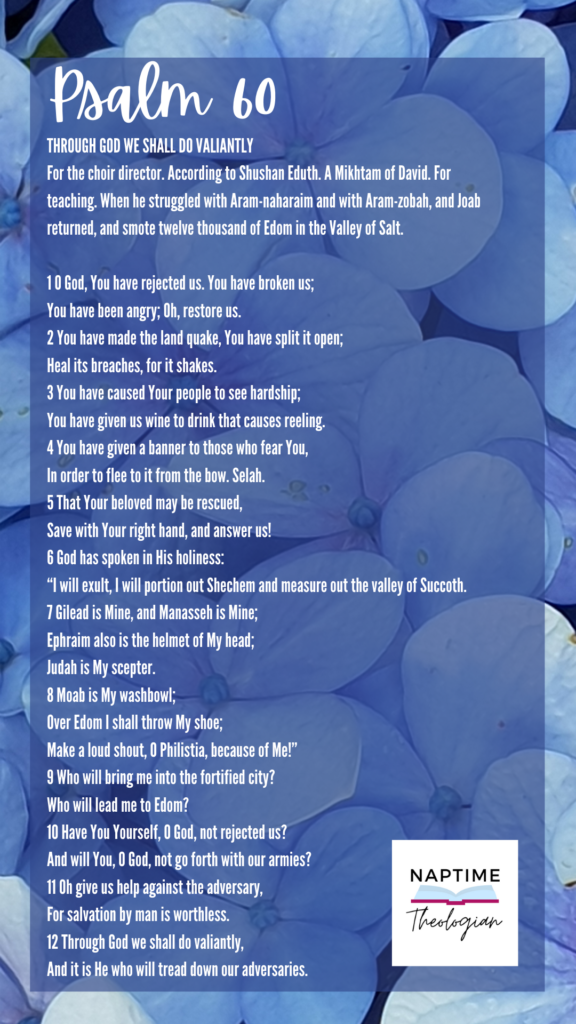Reading the Psalms should be easy, right? After all, they are filled with praise, hope, and God’s character. But have you opened your Bible to Psalms expecting to be encouraged and uplifted only to find it say, “How long, O Lord? Will you leave us forever?” or “O God, why have you rejected us forever?” You’ve opened up to a lament Psalm.
But wait! Don’t turn the page! Psalms of lament are important and encouraging too. Let’s find out why together.
What is a “Lament Psalm?”
First of all, what exactly is a “Lament Psalm?” A lament is a passionate expression of grief or sorrow. God used several authors to write the book of Psalms, that brings different perspectives of life and different experiences in life from different angles. And some of these authors lament quite a bit.
You can recognize a lament in a Psalm when the writer cries out to God for help or in accusation. Many of the laments in Psalms start with, “Why, God?”
I give you this classification because it is actually very difficult to label an entire Psalm as a lament Psalm. There are many psalms that begin in lamenting and then end in praise or another focus. So instead of thinking of a particular Psalm as lamentation, we have to see the different sections of the Psalms as laments. It’s important for us to recognize what the lament section is and that we need to learn from them, not just skip over those harder sections of Scripture.
We interact with laments in the Psalms pretty regularly. In my personal study I’ve found that some of the most encouraging verses from Psalms came from a Psalm that started with lamenting!
For example, Psalm 59 starts with a cry to God for deliverance and rescue. Then later comes verse 16: “But as for me, I shall sing of Your strength; Yes, I shall joyfully sing of Your lovingkindness in the morning, for you have been my stronghold and a refuge in the day of my distress.”
This is a perfect example of how a Psalm has a section of lament, but changes later. We couldn’t label all of Psalm 59 as lamenting when it ends in praise.
So that’s what laments are in the Psalms. Here’s how we can learn from them and be encouraged.
Lament Psalms Help Us Express Sorrow
I have heard laments in the Psalms called “clunkers.” You’re reading along, you’re enjoying the praise, the adoration that fills the Psalms. And then, “clunk!” You reach a lament, a cry to God for help.
If you remember that the structure of the Psalms follows the story of Israel (read about that structure here), and therefore, the story of redemption, we have to recognize that life is not all rainbows and butterflies.
I like that term, “clunker,” because that is exactly how our lives are too. We may be walking along, living life, having fun, serving the Lord, then, “clunk!” An unexpected trial comes, you have to stay at the hospital, you lose a loved one, you have to move unexpectedly. Whatever it may be, we don’t see these things coming and they “clunk” into our lives like a weight.
That’s where laments in the Psalms come in.
When we’re left whirling with no place to turn but to God, we can lament like the Psalmist and turn to God with out emotions and questions.
In fact, the laments teach us to express our emotions to God by asking questions. We read, “Why have you forsaken me, God?” or, “How long, O, Lord?” and we feel those questions. We know those sorrowful questions because we want to ask them ourselves. The psalmists help us express our sorrows, longings, and questions, to God through Scripture.
And, many times, when we are sorrowful, when we’ve lost a lot, we cannot come up with the words to say to God. By reading through the laments, we gain words to pray to God because we can pray the same words as the psalmists in the lament.
The laments of the Psalms help us express our sorrow by giving us words to pray when we have none. But the laments of the Psalms also point us back to God when we’re in the midst of our pain.
Lament Psalms Point Us Back to God
When we read through laments in the Psalms, we must keep reading! We must keep reading because the laments in Psalms point us back to God in the midst of our sorrow and pain.
As I said, many encouraging verses from the Psalms actually come from a Psalm that starts with a lament. The psalmist starts by asking God all these questions and begging for help. Then there comes a “pivot” point in the psalms. A verse where the writer turns back to God.
One pivot I’ve found encouraging is in Psalm 60. We know from the superscript that David wrote this Psalm after struggling in battle and losing. The opening verses describe the devastation they’ve experienced and call to God for help.

Then the last verse holds the pivot, “Through God we shall do valiantly, and it is He who will tread down our adversaries.”
While David is talking about armies and war, this pivot encourages us in our own battles in life. Whether we are fighting for our joy in the midst of sorrow or fighting for purity in the midst of sin, it helps us recognize that we cannot overcome without God’s help. It’s only in Him that we will succeed or “do valiantly.”
And laments in Psalms are like that. They point you back to God. Back to His power, His might, His holiness, His strength, His covering, His protection, and His character. They point back to Him because He is the one our lives are to be about. And we cannot go on without Him.
So when we’re reading these laments in the Psalms, we have to keep reading them and find that pivot point. Find the place where it gets turned around because the psalmist turned his heart toward the Lord and the Lord helped him.
And just as the laments in the Psalms help us to express our sorrow by giving us words to pray, these pivot points in the laments also give us words to pray. We can trust God’s faithfulness in the midst of trials and suffering because He has said in 2 Corinthians 4:17, that our afflictions are achieving glory for Him. And He has also promised in Romans 8:28 that everything in our lives is for our ultimate good, even our suffering and sorrow. And we also know from the book of Revelation that one day Jesus will come back to right every wrong and renew the world completely. So pray through those pivot points just like the psalmists. Turn your heart to God in the midst of sorrow, He is faithful and He will be faithful.
Lament Psalms Reflect Our Lives
We all have sorrows. We have all been through something hard and difficult in life. I’m pretty certain that you have asked God, “Why?” when you’ve experienced trials. That’s how lament Psalms reflect our lives. They tell us that God knows we are experiencing pain, that He knows we will be weak. He even knows that we will question Him at times and wonder why He has forsaken us (even though He really hasn’t).
But God also knows that we learn through laments, we learn through hard things. It’s the pain and sorrow of life that make us depend on God even more. Paul says that God’s power is made perfect in our weakness (2 Corinthians 12:9).
Laments in the Psalms are models of how to have faith in the midst of disorientation and loss. They reflect the same sorrows that we face in life and then say to us, “It’s okay, keep trusting God.”
And, friends that is what I want to say too. Let me be your David today. Your sorrow, your pain, your loss, draws you closer to Christ. First Peter 5:7 tells us that He cares for your every care, Hebrews 4:15 tells us He knows our every pain, and Matthew 28:20 says that He is there for us always.
So, call out to God in times of sorrow and lament. Call out to Him and find Him ever faithful and ever true.
And maybe, next time you pick up your Bible, read through a Psalm that contains lament.
Related Posts:
Structure of the Psalms | God’s Faithfulness
How to Understand Psalms 1 and 2
6 Verses to Pray For Your Kids from the Psalms
Some of My Favorite Resources:
This post contains affiliate links, read my full disclosure here.




1 Comment